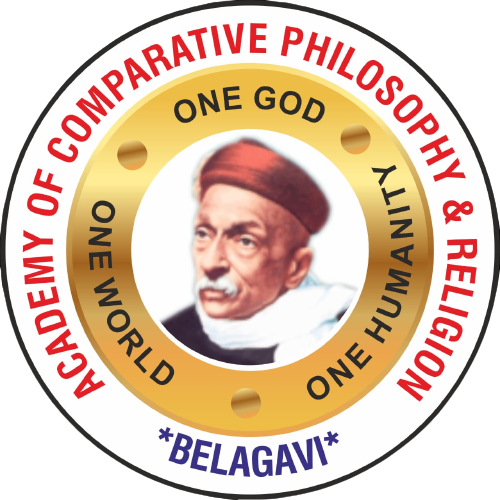ACPR
The Academy of Comparative Philosophy & Religion
We must make clear, however, the meaning of Religion, for no term is liable to be more misunderstood. By Religion we mean the direct first-hand relationship of Man and God, and not any un-systematised and un-criticised methods of belief and practice. Thus we must distinguish Religion from its various “forms.” If there is a uniqueness about the relationship of Man and God, such uniqueness must subsist wherever Man exists. Hence there is no meaning in saying that this uniqueness is exhibited in any one form of religion more than in any other.
“Religion” thus stands at the top of all “religions.” We may even say that it is immanent in its various forms. Religion is for all humanity; its manifestations are for different races and climes. Religion is matter of eternity; its forms have only an existence in time. Religion concerns itself with the essential; its forms with the accidental. Religion is the embodiment of the universal; its forms are individual manifestation of it. The relation of the One and the Many is nowhere better exhibited than in the relation of Religion and its various forms.
We have said that Religion, to deserve its high function, must be a criticised and systemised religion. Herein comes in the aid which Philosophy can give to it. Religion has to steer itself clear of the Scylla and the Charybdis that surround it on both sides. For, on the one hand, there is the danger of Superstition, which is an unworthy view of God; on the other, there is Scepticism, which is a denial of God. True Religion has to steer itself clear of both these dangers, and it is only the helm of Philosophy which can steer it straight to a safe and happy haven.
It would thus seem that a Philosophy of Religion would be the supremely engrossing object of our study. It would deal not with the merely logical frameworks of philosophy, nor with the details of ritual and practice as in religion. It must give a philosophical foundation to the human search after the Ultimate. It would consider the points of theology in the various forms of religion which might be of philosophical import, as much as it would discern in nature the foot-prints of God with the help of reason. Natural religion has been sundered too much in our day from a theological study of the different faiths. A true Philosophy of Religion would not find any antagonism between these studies, but try to fit in the empirical data afforded to it by the various forms of religion with a ratiocinative and synoptic view of the Whole.
Such an attempt is almost the first of its kind in India. Our Universities have lent some support to the study of Philosophy in general; but not a single University has made any provision for a study of the different faiths, far less for a study of Philosophy of Religion which may be extracted out of this study, and which may at the same time be made compatible with a philosophic view of Reality. The attempt which the Maharaja Gaekwar of Baroda made a few years ago in this direction by founding an institute for the study of Religions is in sore need of generalisation. We must combine a philosophic view of reality with an empirical study of faiths, so as to be able to find a reasoned justification for our religious aspirations and attainments.
The problem of finding the universal in the midst of particulars, the unchanging in the midst of change, has attracted the attention of every man of vision, whether he be Philosopher or Prince. Plato and Sankaracharya among Philosophers, Asoka and Akbar among Princes are illustrations of the way in which this universal vision has been sought. Plato is known for nothing so much as for his synoptic vision of the universal among the particulars. Sankaracharya spent a lifetime in seeking to know that by knowing which everything else comes to be known. Asoka, in one of his Rock Edicts, forbade the decrying of other people’s faiths,—-for in that way he said one was doing disservice to one’s own faith,—and he taught the virtue of Concourse. Akbar sought after the universal vision by summoning a Council of Religion, for perchance, in that way, he thought that “that lock whose key had been lost might be opened.” There is a far cry from the days of Plato and Sankaracharya, or of Akbar and Asoka to the present day. Knowledge has taken immense strides with the growth of time. Scientific inventions have enormously enriched the patrimony of man. The old order has changed, and a new one has taken its place. Nevertheless, the goal of human life as well as the means for its attainment have remained the same. Unquestionably, the search after God remains the highest problem even to-day, and a philosophical justification of our spiritual life is as necessary today as it was hundreds of years ago.
(Source: Extract from the Prospectus written by Dr. Gurudev Dr R. D Ranade, in 1925)
